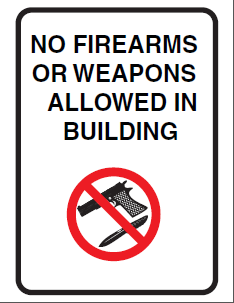Jennifer Walther
Mawicke & Goisman, S.C.
With recent incidents of gun violence, should you reconsider whether to allow or prohibit concealed weapons on your premises? Whether to allow or prohibit the carrying of concealed weapons will be a very individual decision for each business based on legal considerations, the nature of your business, your company’s public image, and your perception of employee morale. The following points below should help businesses make this decision.
A License is Required and Use is Limited.
An individual is only authorized to carry concealed weapons if he obtains a “CCW license.” The Department of Justice, in accordance with very detailed regulations, requires a background check and completion of a firearms training course to obtain the license.
Even if people have a CCW license, they cannot fire a gun in certain places including parks, from a vehicle, or into a building, and cannot intend harm or endanger safety with a weapon. They cannot carry a firearm while under the influence of alcohol or illegal drugs.
Right to Self-Defense has not Changed.
Even before the CCW law, a person could defend himself or another person by using as much force as necessary to prevent or stop an attack, but could not intentionally cause death or great bodily harm unless necessary to prevent imminent death or great bodily harm to him or the other person. These rights have not changed or increased for the person with a CCW license, but now he/she may have a weapon more readily available to exercise self-defense.
Can you prohibit Carrying a Concealed Weapon?
Individuals with a CCW license are allowed to carry concealed weapons on your premises. To prohibit it, you must take some action. An employer can prohibit employees from carrying concealed weapons on the job (on or off premises), but may not prohibit the employee with a CCW license from keeping a weapon in the employee’s own vehicle, even if used for the job or parked on your property.
An employer prohibiting employees from carrying a concealed weapon should publish and enforce a policy explaining this prohibition. In addition, business owners can prohibit visitors from carrying a concealed weapon on their premises. To do so, they must post a conspicuous notice near the entrances to the building, stating concealed weapons are prohibited.
Do You Have Immunity?
If an employer or a business owner decides not to prohibit its employees or visitors from carrying concealed weapons, they are immune from liability arising from that decision.
While immunity sounds appealing, there will still be worker’s compensation claims if employees are injured, and there may be OSHA penalties if the company failed to provide a safe workplace. There is no immunity for injuries caused by non-licensed individuals. Further, immunity applies only to liability “arising from” the decision to not prohibit concealed weapons, leaving the door open to creative litigants to argue the injury did not arise from that decision, but from some other act or omission.
While the lack of immunity may sound frightening, there is no presumption of liability if you prohibit the carrying of concealed weapons. Instead, liability is the same now as it was before the CCW law – there may be liability for injuries caused to third persons only if the situation was reasonably foreseeable and the business failed to take reasonable care. For example, did you know a disgruntled employee had a propensity for violence, but did nothing about it?
Prevention is the best cure.
While random acts of violence can never be predicted, you can take measures to increase your security, whether or not you prohibit the carrying of concealed weapons on your premises.
Implement a zero-tolerance policy for violence. Conduct background checks when hiring. Train supervisors to recognize and report troubling conduct. Require employees to report any threats and abusive behavior. Investigate all acts or threats of violence. Have an action plan for responding to an incident of workplace violence. Select an appropriate time and location for terminating an employee to maintain privacy and security, and do not let the employee go back to the workstation alone.